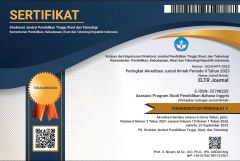TEACHING ENGLISH TO FOOD AND BEVERAGE STAFF USING A ROLE-PLAY METHOD
Abstrak terlihat: 455 / PDF terunduh: 349DOI:
https://doi.org/10.37147/eltr.v7i2.175Keywords:
English for specific purposes, food and beverages, role-playAbstract
This study is conducted to apply the role-play method in teaching English for Specific Purposes (ESP) specifically for teaching English to Food and Beverages staff at Melcosh Café so that they can handle foreign customers who visit the cafe. The steps that we take will be by Huang’s theory (2008), which are (1) deciding the teaching material, (2) selecting the situation and creating the dialogue, (3) teaching dialogue for role play, (4) having students practice the role play, (5) having students modify the situation and dialogue, and (6) evaluating and checking students' comprehension. To make them learn better and also get the best result, it is better to learn and train their English using role-play methods so that they get the feeling of serving foreign customers in real-life situations. The result of this study is the handbook which incorporates ESP principles and roleplay practice.
Downloads
References
Anthony, L. (n.d). English for specific purposes: What does it mean. Retrieved 15 June 2023, from https://www.laurenceanthony.net/abstracts/ESParticle.html
Belcher, D. D. (2012). English for specific purposes: Teaching to perceived needs and imagined futures in world of work, study, and everyday life. TESOL, 40(1), 133-156. https://doi.org/10.2307/40264514
Bin, W. (2014). English for specific purposes on its way. Journal of University of Shanghai for Science and Technology (Social Science edition), 36(1), 1-6. Retrieved from https://jss.usst.edu.cn/html/2014/1/20140101.htm
Blatner, A. (2009). Role-playing in education. Retrieved from http://www.blatner.com/adam/pdntbk/rlplayedu.html
Bonwell, C. C., & Eison, J. A. (1991). Active learning: Creating excitement in the classroom. 1991 ASHE-ERIC higher education reports. Retrieved from https://eric.ed.gov/?id=ED336049
Creswell, J. W., & Poth, C. N. (2017). Qualitative inquiry and research design: Choosing among five approaches (4th Ed.). London: Sage Publications.
Crystal, D. (2003). English as a global language. Cambridge: Cambridge university press.
Harbour, E., & Connick, J. (2005). Role-playing games and activities rules and tips. bussinessballs.com. Retrieved from https://www.businessballs.com/roleplayi nggames.htm
Huang, I. Y., & Shan, J. (2008). Role play for ESL/EFL children in the English classroom. The Internet TESL Journal, 14(2), 1-10. http://iteslj.org/Techniques/Huang-RolePlay.html
Hutchinson, T., & Waters, A. (1987). English for specific purposes. Cambridge: Cambridge university press.
Insights, E. (2023). Hospitality industry: All your questions answered. Retrieved 15 June 2023, from https://hospitalityinsights.ehl.edu/hospitality-industry
Johns, A. M., & Dudley-Evans, T. (1991). English for specific purposes: International in scope, specific in purpose. TESOL Quarterly, 25(2), 297-314. https://doi.org/10.2307/3587465
Kenneally, C. (2007). The first word. New York: Viking Penguin.
Lebaron, J., & Miller, D. (2005). The potential of jigsaw role-playing to promote the social construction of knowledge in an online graduate education course. Teachers College Record, 107(8), 1652-1674. Retrieved from https://eric.ed.gov/?id=EJ694405
Muhartoyo, M. (2007). Introduction to research methodologies in language studies. Lingua Cultura, 1(1), 11-18. https://doi.org/10.21512/lc.v1i1.257
Nordquist, R. (2021, July 31). English language: History, definition, and examples. Retrieved from https://www.thoughtco.com/what-is-the- english-language-1690652
Rao, D., & Stupans, I. (2012). Exploring the potential of role-play in higher education: Development of a typology and teacher guidelines. Innovations in Education and Teaching International, 49(4), 427-436. https://doi.org/10.1080/14703297.2012.728879
Rif’ah, L. (2022). English for specific purposes (ESP). …. What does it mean? | Binus University Malang. Retrieved 15 June 2023, from https://binus.ac.id/malang/2022/08/english-for-specific-purposes-esp-what-does-it-mean/
Robinson, P. C. (1980). ESP (English For Specific Purposes). Oxford: Pergamon Press, Ltd.
Rojas, M. A., & Villafuerte, J. (2018). The influence of implementing role-play as an educational technique on EFL speaking development. Theory and Practice in Language Studies, 8(7), 726-732. https://dx.doi.org/10.17507/tpls.0807.02
Seto, A. (2013). Speech acts annotation for business meetings. The Asian ESP Journal, 9(2), 119-147.
Strevens, P. (1988). ESP after twenty years: A re-appraisal. In M. Tickoo (Ed.), ESP: State of the art (pp. 1-13). Singapore: SEAMEO Regional Language Centre.
The Working Centre. (2023). Food and beverage industry. Retrieved 15 June 2023, from https://www.theworkingcentre.org/food- and-beverage-industry/700
Downloads
Published
How to Cite
Issue
Section
License
Copyright (c) 2023 Odellia Bunga Wijanarko, Kezia Christy Sandika, Fransisca Tyas Ayu Kinanthi

This work is licensed under a Creative Commons Attribution-ShareAlike 4.0 International License.











 ELTR Journal,
ELTR Journal, 